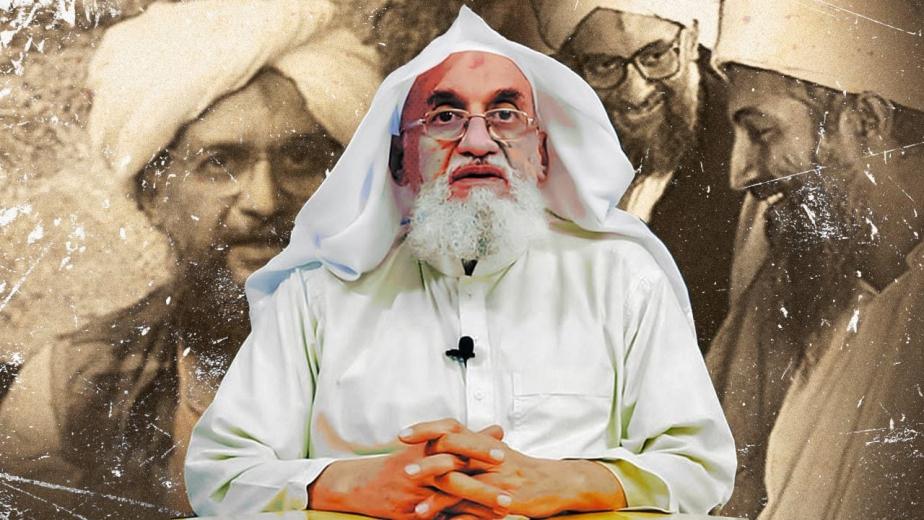
Ayman al-Zawahiri (Akhbar Alan)
آخر تحديث في: 08-08-2022 الساعة 9 صباحاً بتوقيت عدن
*Ibrahim Ali (South24)
After years of pursuit, an American drone was able to reach the hideout of al-Qaeda's leader Ayman Al-Zawahiri. US President Joe Biden announced last Tuesday that al-Zawahiri was killed by a CIA airstrike in the Afghani capital city of Kabul.
Targeting Al-Zawahiri came 11 years after killing Osama Bin Laden, the most prominent historical AQAP leader in the Pakistani city of Abbottabad. The years between the assassinations of the two leaders witnessed many events, foremost of which was ISIS’s declaration of establishing an “Islamic caliphate”. This announcement led to the most difficult decision in the history of al-Zawahiri’s leadership. Many al-Qaeda's leaders believe that “Bin Laden would have taken a different decision, even if he was not a supporter of it, in order to limit the dispute to a certain level and to avoid developing it into a conflict like what happened under al-Zawahiri’s leadership”. This dispute played a pivotal role in al-Qaeda's decline at its main center and branches in many countries.
This particular point stirs a question about the impact of al-Zawahiri’s assassination on the al-Qaeda's offspring in Yemen which has special ties with Bin Laden’s predecessor and was the most affected branch from the dispute with ISIS. It found itself obliged to follow the suit of the general leadership although its main base was more closer to ISIS than the al-Qaeda. Therefore, the defection occurred after al-Zawahiri refused to pledge allegiance.
Furthermore, Yemen's branch considered the sharp criticism by ISIS’s spokesperson towards al-Zawahiri, especially when he said: “Hey, al-Qaeda leader'' as a justification for his stance which was against the passion of its base in Yemen after refusing to pledge allegiance to ISIS. This branch believed that it stands on a solid ground to defend the “the first jihadist people” but it was not exactly the case. This is not attributed to the defection only but it suggested the decline of enthusiasm of most of its non-dissident members and leaders.
In this regard, exclusive sources said that Nasir al-Wuhayshi, former leader of AQAP was affiliated with al-Zawahiri wing rather than Bin Laden unlike the common notion. This justifies his anti-ISIS stance. In general, this influential presence of al-Zawahiri in the Yemeni branch stirs questions about the impact of al-Zawahiri death on the branch in both negative and positive sense.
Disintegrated and won’t be affected
In this regard, a former jihadist believes that the AQAP won’t be negatively impacted by al-Zawahiri’s assassination. He added: “Al-Zawahiri had no influence on the organization’s global leadership, regarding the development of AQAP militarily and administratively”. He believes that al-Zawahiri was preoccupied with one issue, to fight whom he called The Kharijites (ISIS). The mentality of the al-Qaeda may drastically change at this point which could lead to reconciliation with ISIS.
The Yemeni jihadist told “South24” that “if there is a predecessor for al-Zawahiri who has the ability to lead al-Qaeda in a way similar to Bin laden, its position can largely change in Yemen and other places. It can develop at the level of mentality and improve its security system in order to reduce penetration”. According to the man, al-Qaeda lacks experienced masterminds after the assassination of many leaders and its being internally penetrated by spy cells which extended to its top layers. This made it lose its influence and pushed its cadres to abandon it”.
He added: “Thus, killing al-Zawahiri won’t have a big impact as the organization in Yemen became disintegrated due to the penetration and the bad leadership as well as the lack of masterminds. The positive impact depends on Al-Zawahiri’s predecessor and his leadership skills”. Without achieving this, the former jihadist said that “the page of AQAP will be wrapped off and will be just a part of the jihadi islamit movement”.
Like a dictator
Commenting on al-Zawahiri as al-Qaeda's leader in comparison with his predecessor Bin Laden, the former jihadist said that “Al-Zawahiri along with Bin Laden and others founded the al-Qaeda's and established its rhetoric's. However, after the assassination of the group’s godfather, al-Qaeda became fragile, scattered, and weak and penetrated by local and international intelligence bodies as happened in Yemen and other places.
The jihadist, who previously met Bin Laden and al-Zawahiri, claimed that al-Zawahiri words are more than his deeds unlike Bin Laden who was a taciturn but he was able to achieve many things. According to him, this is proved by the lack of influence of the al-Qaeda's branch in India which was declared by al-Zawahiri. He believes that al-Zawahiri is the main reason behind the conflict over the global jihadi leadership among ISIS, al-Qaeda in Levant, Yemen and Somalia and others.
Such contradictions according to the former jihadist pushed al-Zawahiri to be an authoritarian leader. This made the al-Qaeda more fragile and made al-Zawahiri like a dictator in his leadership.
Accordingly, it can be said that al-Zawahiri led all al-Qaeda's branches including Yemen to an advanced phase of weakness and disintegration because of his policies.
*Ibrahim Ali is a pseudonym of a researcher specialized in the armed group affairs. He demanded anonymity for personal reasons.